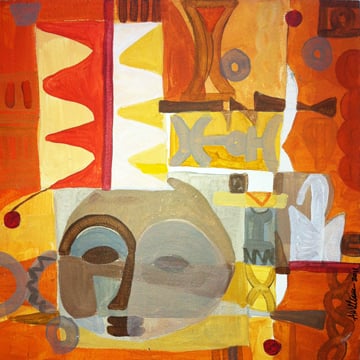24/7/365 broadcast series highlights community artists, Black history

Photo courtesy of Angela Williams
Angela Williams’ mixed-media prints – inspired by African Andira symbols – bring together modern and traditional African art. Williams will speak about her work as a part of the Fleetwood-Jourdain Theatre’s 24/7/365 Black history broadcast series.
February 10, 2021
Dr. Elisha Hall is neither a stranger to the recording studio, nor to storytelling. He released his first instrumental album last month, and his three children often clamor for bedtime tales, which he draws from his thesis work on West African storytelling. Now he’ll bring the two passions together to make his storytelling debut on air.
“Storytelling is a genre, yes,” Hall said. “But before it is a genre, it is a way of living, it is a way of being.”
Hall will join Evanston’s Fleetwood-Jourdain Theatre as the group kicks off its Black history project called 24/7/365: A Legacy of Greatness. The series features ten-minute broadcasts by local Black chefs, musicians, storytellers and visual artists.
“(It’s) a year-round effort … for the Black community to uplift and to teach and to acknowledge all the wonderfulness that Black Americans, African Americans and those from other countries have contributed to humanity,” Tim Rhoze, the Theatre’s artistic director, said.
A conversation several years ago between Rhoze and Lesley Williams — former head of Adult Services at the Evanston Public Library — sparked the idea for the project, an eleven-month series of Black history programming to sustain celebration of Black accomplishments, rather than limiting historical programming to Black History Month.
The Fleetwood-Jourdain Theater worked with Art Encounter, the EPL and the Shorefront Legacy Center to connect with visual artists, storytellers and chefs, respectively.
Rhoze worked with musician and composer Anita Turner Baker to recruit opera singer Carl Alexander (Bienen M.M. ‘17) and violinist Natalie Frakes. Alexander plans to speak about the roots of protest music in Black churches, the need for diversity in modern opera and dismantling the notion that classical music is a White, Western and archaic space.
“With operatic music and art-song music, stuff that is vocal has text, and we’re able to see that not very much has changed,” Alexander said. “We’re dealing with some of the very same human issues now as we did then.”
Mixed-media artist, designer and Chicago Museum of Science and Industry Deputy Creative Director Angela Williams hopes to draw a similar historical connection in her broadcast.
Though she works primarily through watercolor, Williams has found focusing on African art and textiles helps her connect more closely with her heritage. Lately, she’s started transforming her paintings into collages, a process that reflects her experience learning to piece together her African roots.
“Thinking about pieces of things, that’s how African Americans have kind of learned about their heritage,” Williams said. “You get pieces of stories that you hear about, kings and queens in Africa, or families and how they may have lived.”
For African student educator Hall, the 24/7/365 series feels especially personal.
Hall, an Evanston Township High School alumnus, will retell West African story Gassire’s Lute on Feb. 16. Hall’s beloved high school drama teacher, Gloria Bond Clunie, is the Fleetwood-Jourdain Theatre’s founding artistic director.
Hall has chosen to dedicate his reading to Evanston resident QuoVadis Harper, who passed away in January. Hall said Gassire’s Lute reminds him of Harper in its message about legacy.
“This story is about how our stories live on beyond us,” said Hall, who also chose Gassire’s Lute for its focus on traditional African values like selflessness and community improvement. “We have to keep in constant thought, how is our work right now something that our ancestors would make be proud of, and something that our future generations can look to?”
Like Hall, the majority of the 24/7/365 participants have a background in teaching and in art. Now, as they teach audiences how they use art to uplift moments in Black history, they will also engage community members to discuss supporting the next generation of Black artists.
Frakes, another one of Baker’s colleagues, will use her space in the project to emphasize the barriers Black students in underfunded school districts face to studying instrumental music.
“I want people to understand that it’s important for people of color to be places where they’ve never been before,” said Frakes. “Especially with string education, there needs to be a serious change and a strategy to make more students of color want to learn these instruments.”
When all ten broadcasts have concluded at the end of February, Rhoze and his collective of creators hope that viewers will come to appreciate the role of Black artists in honoring their community’s history, and in using the lessons of the past to inspire future creative pursuits.
“When Black artists begin to talk about their processes, and how they come up with their ideas,” Rhoze said. “You get to be a fly on the wall, see these really brilliant, creative minds working and explaining. So it’s about learning something new, and just expanding your own vocabulary about the world around you.”
Email: [email protected]
Related Stories:
— Black History Month features intersectional dialogues
— ETHS student, Fleetwood-Jourdain gallery founder highlight their experiences as ‘history makers’
— Art exhibit celebrating Black History Month to open at Noyes Cultural Arts Center











